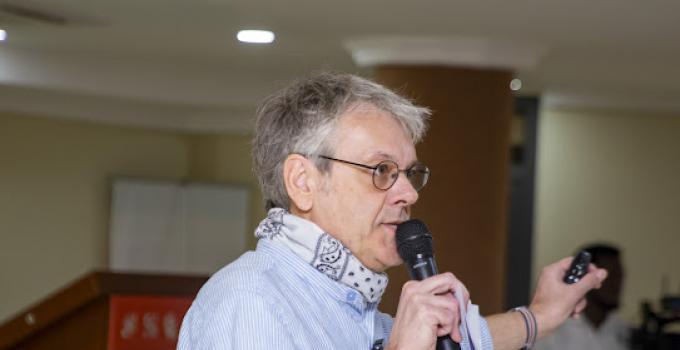A renowned linguist from Germany’s RWTH Aachen University, has called for a localized approach to communicating the urgency of climate change, arguing that overreliance on universal symbols risks misinterpretation and disengagement.
His remarks came during the Second Special Edition of the Language and Communication Seminar Series at Kwame Nkrumah University of Science and Technology (KNUST), themed “Language and Communication Pedagogy in the Era of Climate Change”, organized jointly by KNUST’s Department of Language and Communication Sciences and RWTH Aachen University.
Speaking to an audience of academics, students, and researchers, Dr. Arich-Gerz emphasized that while international frameworks like the United Nations’ climate campaigns have raised global awareness, they often fail to resonate with local communities.
“Melting icebergs or polar bears on shrinking ice may not strike a chord with farmers in Ghana’s savannah regions battling erratic rainfall,” he noted. “To bridge this gap, we must integrate culturally relevant symbols, stories, proverbs, or imagery that reflect lived experiences, into climate communication,” he added.
The linguistics expert warned that abstract or foreign-centric messaging could lead to misunderstandings, particularly, in regions where climate impact manifests differently. For instance, he noted that rising sea levels might dominate global discourse, but desertification, dwindling freshwater sources, or shifting agricultural cycles are more pressing concerns in many African communities.
“A one-size-fits-all approach risks alienating the very audiences we need to reach,” he emphasised. Dr. Arich-Gerz highlighted successful case studies, such as using traditional folklore in West Africa to explain ecosystem interdependence or employing local art forms in South Asia to depict deforestation’s consequences. He urged educators and communicators to collaborate with community leaders, indigenous knowledge holders, and linguists to co-create tailored narratives.
Dr. Bruno concluded with a call for more research on localized climate pedagogy, particularly in the Global South, urging a collaboration between indigenous knowledge holders, communicator, and linguists to co-create tailored narratives.
By: Novire Kuuyizie Francis

